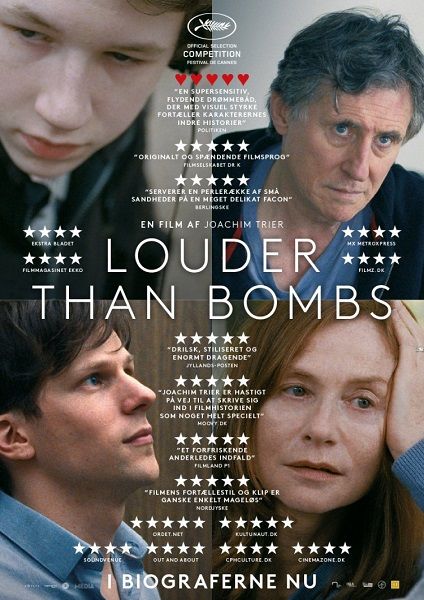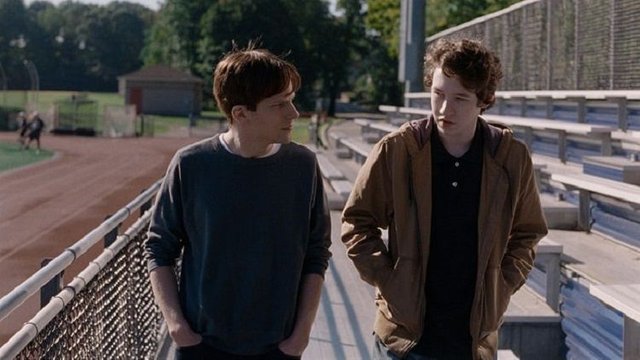"Louder Than Bombs" by Joachim Trier - movie review
While everyone can risk and enjoy "Thelma"(Scandinavian cinema. "Thelma" by Joachim Trier), I want to recall another film by Joachim Trier, which, though betting only on realism, deepens somewhere beyond. If anyone accidentally searches for a structure to help him tell about loss and death, I think what Trier has chosen is one of the best solutions. When I start watching the film, I made it clear that my choice was dictated by all of my love for Isabelle Yuper and secondly to the director, and I sincerely regretted seeing the scene revealing the death of her character Reid . Fortunately, however, this is so, and it is not exactly that - a truth that even as a film composition applies to everything we can say about the end. In fact, the film is built of scenes of the present and the past, which are alternated and gradually assembled as a complex puzzle. While our eyes are slowly revealing a true family picture of large, large-scale footage from time to time, we have the feeling that we have worn a diopter that blurred reality and gradually diminishes and decreases with each scene until the end of the movie brings more than consolation - reconciliation.

In general, Trier decides to convey the theme of grief by losing first by tracking down the smallest family member, Conrad (Devin Druid), who may be the youngest, most severely experienced the reality of death. His situation is even worse because he does not know for a long time exactly how his mother died, which may catalyze the anger that a boy in his teenage age carries. All the more so that the closer we are to the beginning of life, the more we are more irreconcilable with its end. Therefore, just opposite to his son, the father in the family, Gabriel Burn, sinks into the waters of reconciliation and forgiveness, as if these conditions can only be known in maturity. In fact, the film begins with a message directly delivered - the elder brother is in the hospital with his newly-born child and his wife and there, somehow without wanting to forget to bring her food and forgets to tell one truth. And that forgetfulness is more deafening than bombs. Retrospective cadres with the beautiful Isabelle Yuper as a photographer who travels hot spots around the world seem to be making a timid attempt for a social mimicry. But it may not be as easy as several frames of the Middle East war to make the film engage with the problems of world peace. From this point of view, the only meaning imported documentaries and photographs are that war outside is always less deafening than the war inside. Isabelle Awperd conveys this meaning almost without words, through several long frames focused only on her face. There is one particular acting in which she looks in a mirror. I suppose everyone can choose what to see, but I swear that there is everything there is between life and death.

"Louder Than Bombs" with enviable ease shows the complex dynamics that can develop within a "modern family". Norwegian director Joachim Trier prepares and arranges a personal exhibition of paintings / moments that blur the boundary between the present and the past, creating an "existential purgatory" on the territory where his characters have the hope of finding the way forward. He skillfully plays with their psychological profile - positioning them strategically in a simple plot that is, however, filled with enough potential energy to hold the viewer in tension and deserve his sincere interest. Fortunately, all of this accumulation of psychological and emotional charge never passes into the kinetic area with thunder and crash. Trier runs away from the explosions and cheap pathos inherent in dramatic in its most uninteresting form (though the title might hint and vice versa). The sound the boss wants to boldly oppose bombs is none other than the powerful cry of the man who has lost himself in the vast, incomprehensible spaces of his life. So, Trier, faithfully and even conservatively, uses the cinematic language to convey the seeming harmony that is broken for a loss. It turns out that losing is not just one, it carries many faces. The tape tracks the different nuances of mourning while retrospectively returns time and constantly asks questions. Therefore, although undynamic as a plot, the film is dynamic as the states it transmits, which, we must agree, is a difficult task. It is even more difficult after such a storyline to stay with the vague suspicion that every picture is worth it and makes sense.
The end of the movie implies that there is actually a way forward that traumas can be healed with love and patience. Trier urges his characters to take the first step outside the purgatory. He hints at him directly into a dream of Conrad, where the past, the present, but the future, finally meet. In this peculiar archetypal-eschatological space, everything can be seen clearly (meaningfully and comprehensively), but it is no longer necessary because they are all together. This is the dream of eternity, where love finally triumphs, and in which Trier's characters can now be "forever with each other" and so - themselves.
To listen to the audio version of this article click on the play image.

Brought to you by @tts. If you find it useful please consider upvote this reply.
This post has received gratitude of 11.88% from @appreciator courtesy of @godflesh!
Very imformative and interesting! I haven't really ever been a fan of this sort of film, but it actually sounds pretty decent. I might have to check it out! I've found diving into things I'm not really used to normally haas the best results... As an inspiring film maker and all that, I guess it helps!
i want join you